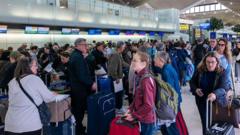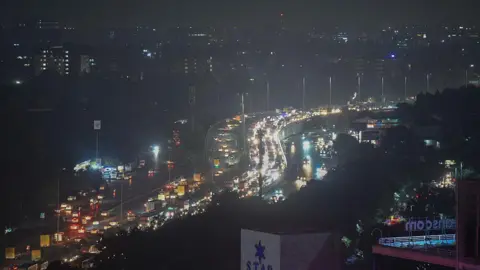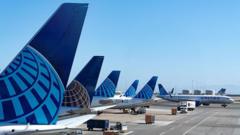Newark Liberty International Airport recently experienced a critical communication failure among its air traffic controllers, alarming both aviation officials and travelers. On April 28, controllers reported being "unable to see, hear, or talk to" the planes under their jurisdiction, with the outage lasting for approximately 30 seconds. Though U.S. Transportation Secretary Sean Duffy assured the public that there was no imminent danger of crashing, the episode has raised serious concerns about the fragile state of air traffic control infrastructure.
The incident triggered an immediate response, leading several controllers to take trauma leave, which has significantly impacted staffing levels. Over 150 flights were cancelled just the following Monday, as noted by FlightAware, amidst an ongoing staff shortage that has been affecting Newark Airport—one of the busiest aviation hubs in the vicinity of New York City.
Duffy explained that the primary communication line failed and the backup did not engage, resulting in a lapse of contact that reflects deep vulnerabilities within the air traffic control system. The Federal Aviation Administration (FAA) responded by acknowledging that such an antiquated system directly influences its workforce, making it challenging to quickly replace those who are on leave. The FAA confirmed that training for new controllers is ongoing, yet the replacement process is far from swift.
Adding to the complications, United Airlines has opted to cancel approximately 35 flights a day from Newark due to the airport's inability to manage the volume of scheduled aircraft effectively. United's CEO Scott Kirby emphasized that recent failures of crucial air traffic technology have caused numerous diversions and delays, complicating an already difficult staffing situation, as more than 20% of FAA controllers reportedly left their jobs in recent weeks.
The National Air Traffic Controllers Association confirmed that the traumatic nature of the communications failure led some employees to take paid leave under existing provisions, but the union did not disclose specific numbers concerning the fallout.
Amid this turmoil, the U.S. Department of Transportation has revealed plans to hire 2,000 new FAA air traffic controllers this year, aiming to stabilize operations in the long run. Furthermore, Secretary Duffy announced intentions to present a proposal to Congress that would seek substantial funding for necessary infrastructure developments. This initiative includes significant upgrades to telecommunications, radar systems, and overall air traffic control infrastructure aimed at remedying the systemic issues that were on display in this recent incident.
The incident triggered an immediate response, leading several controllers to take trauma leave, which has significantly impacted staffing levels. Over 150 flights were cancelled just the following Monday, as noted by FlightAware, amidst an ongoing staff shortage that has been affecting Newark Airport—one of the busiest aviation hubs in the vicinity of New York City.
Duffy explained that the primary communication line failed and the backup did not engage, resulting in a lapse of contact that reflects deep vulnerabilities within the air traffic control system. The Federal Aviation Administration (FAA) responded by acknowledging that such an antiquated system directly influences its workforce, making it challenging to quickly replace those who are on leave. The FAA confirmed that training for new controllers is ongoing, yet the replacement process is far from swift.
Adding to the complications, United Airlines has opted to cancel approximately 35 flights a day from Newark due to the airport's inability to manage the volume of scheduled aircraft effectively. United's CEO Scott Kirby emphasized that recent failures of crucial air traffic technology have caused numerous diversions and delays, complicating an already difficult staffing situation, as more than 20% of FAA controllers reportedly left their jobs in recent weeks.
The National Air Traffic Controllers Association confirmed that the traumatic nature of the communications failure led some employees to take paid leave under existing provisions, but the union did not disclose specific numbers concerning the fallout.
Amid this turmoil, the U.S. Department of Transportation has revealed plans to hire 2,000 new FAA air traffic controllers this year, aiming to stabilize operations in the long run. Furthermore, Secretary Duffy announced intentions to present a proposal to Congress that would seek substantial funding for necessary infrastructure developments. This initiative includes significant upgrades to telecommunications, radar systems, and overall air traffic control infrastructure aimed at remedying the systemic issues that were on display in this recent incident.



















